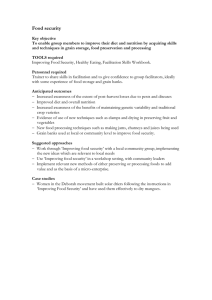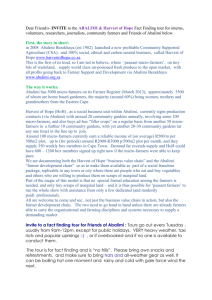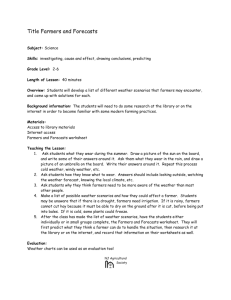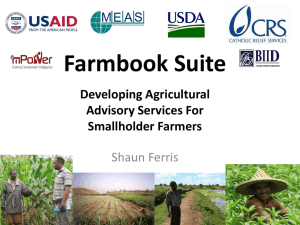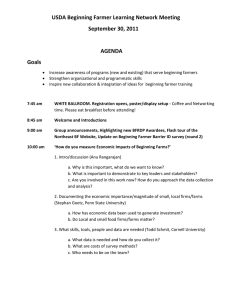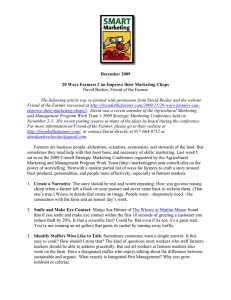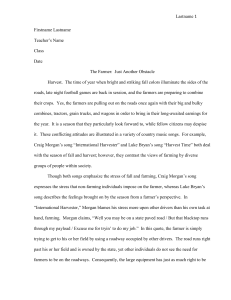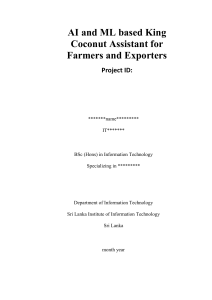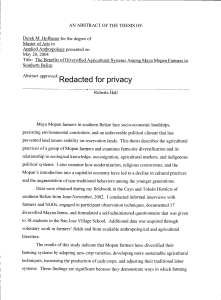Partnership Models in Delivering Mobile Agriculture Programs
advertisement
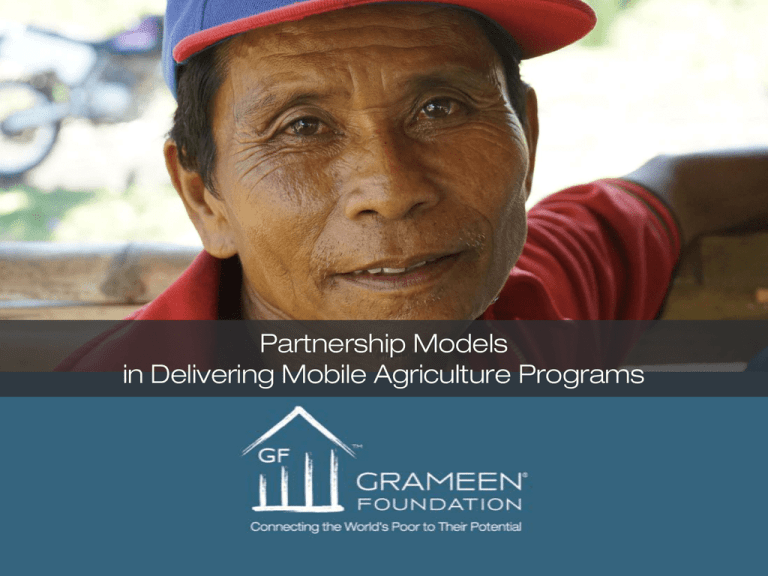
Partnership Models in Delivering Mobile Agriculture Programs Our Approach TaroWorks Mobile Tools Data collection Information dissemination Last-mile Agent Networks Transactions Field force management Analytics, scoring, reports and dashboards Strategic Alliances with Market Players Effective and Inclusive Extension Government of Colombia: Improving food security and nutrition through backyard gardens Problem we’re solving for: Poor nutrition; child malnourishment; cycles of food insecurity with cash crops Partner: Local Government of Antioqua Solution overview: • Accelerate & deepen impact of Government’s backyard garden program • Equip agents w/ mobile tools to register families and monitor food security & nutrition, train on and provide garden supplies • Send SMS campaigns on nutrition/food security Key results (as of June 2015): • Deployed 115 mobile-enabled agents • Serving 139,925 families; 38,819 households • 60% time reduction in data management • Data used to target feeding programs Linkage to Output Market Cafeteros Connectados: Promoting market access via certification, quality & GAP adoption in Colombia & Guatemala Problem we’re solving for: Mismatch in supply & demand; high produce rejection; payment delays; time-consuming & error prone records approach; lack of standards compliance limits SHF participation Partners: Coocafisa Cooperative, Starbucks, Palantir Solution overview: • Promote adoption of GAP and Fairtrade and CAFÈ Practices to open markets • CKWs collect baseline, develop farm plans, & facilitate training w/ mobile tools • Reports & farmer profiles designed for value chain players like Starbucks Key results (as of June 2015): • 291CKWs serving 2,114 households • 99% of farmers created farm plans w/ target tracking • Certification info shared with Starbucks • Coops targeting TA based on baselines Agricultural Finance e-Warehouse: Providing mobile receipting, financing, and bulk sales to increase farmer revenue in Kenya Problem we’re solving for: Low prices at harvest; lack of liquidity; few storage and bulking options; low access to finance; poor quality practices post harvest Partners: SMEP Microfinance, Farm Concern International, Software Group Solution overview: • Village Knowledge Workers register farmers, train in post-harvest handling, document harvest quantity/farmer, and facilitate grain aggregation • Harvest records used to facilitate farmer financing enabling farmers to hold grain • Facilitates bulk sales & mobile payments Key results (as of end of pilot Sept 2014): • 30 VKWs registered 4,713 farmers and trained 20,470 on post-harvest solutions • $18,175 of grain sold via e-Warehouse • Average price increase of 47% realized Linkage to Output Market & Agricultural Finance Building resilience of coconut and cacao smallholder farmers in the Philippines Problem we’re solving for: Barriers to resilience including low productivity, late detection of pest and diseases, lack of access to markets and financial services Partners: Philippine Coconut Authority , coconut and cacao buyers, technology service providers, rural bank Solution overview: • Field officers provide content on coconut and cacao production • Facilitation of linkages to appropriate financial services • Promote adoption of organic certification practices and direct market access Lessons on partnerships and key things to consider Building a consortium and strategic alliances Embedding solutions in processes and change management Building a business case Determining longterm owners for integrated solutions Understanding how data from the system will work for different partners Identifying ownership of data sets and ensuring confidentiality while promoting shared access for each of the partners
